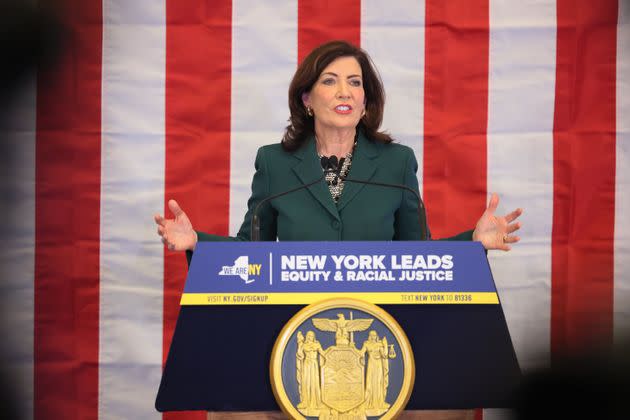New York Considers Reparations For Descendants Of Enslaved People
- Oops!Something went wrong.Please try again later.
New York will formally consider reparations for descendants of enslaved people, thanks to a newly signed bill that forces the state to reckon with its role in the institution of slavery.
Gov. Kathy Hochul (D) signed the bill Tuesday, creating a commission that will study just how much the state of New York benefited from slavery, and come up with recommendations for what reparations would look like. In a speech before the signing, Hochul both praised New York’s history in fighting against slavery, and criticized the many ways that the state profited from it.
“Now in New York, we like to think we’re on the right side of this. Slavery was a product of the South, the Confederacy,” she said. New York officially abolished slavery in 1827, though much of the state’s economy depended on the exploitation of enslaved Black people.
“It’s easy for us to pat ourselves on the back. … We can say we’re the heroes, we fought against slavery. And indeed, many did,” the governor continued. “What is hard to embrace is the fact that our state also flourished from that slavery. It’s not a beautiful story, but indeed it is the truth.”

New York Gov. Kathy Hochul speaks during a press conference and signing of legislation creating a commission for the study of reparations in New York on Tuesday in New York City.
The bill, which was sponsored by Democratic state Sen. James Sanders and state Rep. Michaelle Solages, passed in the state Legislature back in June. The commission created by the law will examine just how much the federal and state government supported slavery, as well as how New York participated in the transfer of enslaved Africans.
A year after its first meeting, the commission will publish a report that includes recommendations for what kinds of reparations it believes are appropriate based on its findings.
With the bill signed, “We empower healing and proactive remedies for our communities,” Solages tweeted. “Fostering unity, addressing wounds, and working towards a healthier, stronger future.”
It’s possible that the recommendations could include financial compensation, an idea that has long been considered controversial among local and federal governments. Republican state Sen. Rob Ortt said he believes the commission’s potential recommendations would come at an “astronomical cost” to New York residents.
But the commission’s report would be nonbinding, as the recommendations are intended to help New York lawmakers better navigate policy changes and create programs that help address the harm from slavery that still impacts Black New Yorkers today.
“I know the word ‘reparations’ brings up a lot of conflicting ideas for people. A lot of people instinctively dig in when they hear it, without really thinking about what it means or why we need to talk about it,” Hochul said. “But I’ll say this: It’s essential to try.”
In 2020, California became the first state to create a reparations task force, which estimated that the state was responsible for more than $500 billion because of over-policing Black communities and redlining that promoted the segregation of Black families. Other states like Massachusetts and New Jersey have considered looking into the possibility of reparations, but none have passed legislation yet.
In 2021, the Chicago suburb of Evanston became the first city to make reparations available to Black residents via a $10 million housing project. In January, a reparations committee in San Francisco proposed the city give each qualifying Black resident $5 million to help mend the racial wealth gap that stems from slavery.
“Racial equity in New York and across the country is tantamount in creating systems that are beneficial for all ― specifically African Americans, who have historically been victims of discrimination and horrific injustice,” State House Speaker Carl Heastie said.
“This commission will study the impact racism and discrimination has had on our institutions and what legislative solutions and structures can be created to make lasting impact,” he continued. “We must create a world fit for the next generation.”
